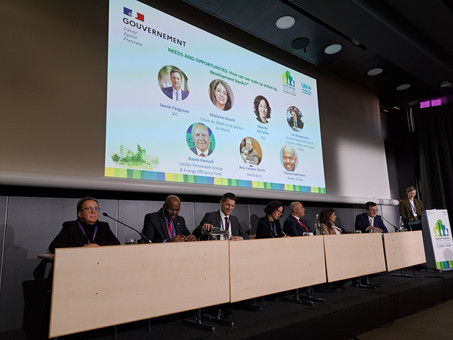REHVA’s Paris Buildings and Climate Global Forum debrief
7-8 March 2024, Paris, France
The Buildings and Climate Global Forum, co-organised by the French government and the United Nations, took place on 7-8 March 2024 in Paris. After the Conference of the Parties (COP28) in Dubai, the Forum gathered ministers and high-level representatives of key organisations, to initiate a new impetus for building decarbonisation and resilience. 800 participants, from all world regions, attended the meeting.
REHVA, represented by its vice-president Johann Zirngibl, participated actively on two sessions:
- Harmonizing policies for whole life carbon and resilient building goals
- Financing green buildings for sustainable development – How development banks can scale up action.
Harmonizing policies for whole life carbon and resilient building goals
This session was dealing with standards and building codes. Several national examples were presented, as the French building regulation RE 2022, LCA and the related database INIES.
There was a general agreement that more harmonisation is needed to create a level playing field, to increase comparability and transparency. However, this agreement was conditioned by the need for “local transpositions”. General goals as building decarbonisation, use of renewables, building energy efficiency are transposed by different national, regional and professional methodologies, hampering the development of harmonised tools, harmonised training and harmonised certification of skills.
REHVA’s comment: Key players in harmonisation, as European (CEN) and international standardisation organisations (ISO), were not attending the panel.
The perimeter for harmonisation and local transposition is not well defined. The harmonisation should focus on the methodology, for example on how to calculate the building energy consumption. The calculation should be “physic based”. Physics do not need “local transposition”. The “local transposition” should focussing on the requirement level, for example 50 kWh/m2y in one country, 30 kWh/m2y in another. Nevertheless, the requirement level should be calculated with the same methodology.
Financing green buildings for sustainable development – How development banks can scale up action.
This session was focussing on development banks and related programs. One of these programs is the Program for Energy Efficiency in Buildings (PEEB). The program was initiated by the governments of France and Germany at COP22. It combines the expertise of its implementing agencies Agence Française de Développement (AFD), Deutsche Gesellschaft für Internationale Zusammenarbeit (GIZ), and Agence de la Transition Écologique (ADEME). PEEB aims to transform the building sector by promoting sustainable building design and construction. It combines financing for energy efficiency in large-scale projects with technical assistance through policy advice. PEEB Cool supports 11 partner countries in hot climates across Africa, Asia, Eastern Europe and Latin America. PEEB Med supports 7 countries in the Mediterranean region.
The building sector has major impact on the climate. By 2060, buildings sector floor area will double. Emerging and developing economies in warm and tropical climates will have the biggest development. In Africa, 53 millions of houses needs to be built in the next years. There will be a huge initial impact, on climate, if these buildings are constructed by bricks, mortar and concrete, and an operational lifetime impact (see figure 1). The emission trading system (ETS) could be an important source of financing.
The panellist underlined that banks have difficulties to evaluate “buildings energy efficiency” and the related savings. Therefore, banks prefer ESCO models (Energy Services COmpanies) based on third investment and EPC (Energy Performance Contracting). The need for public incentives to facilitate private money flow was underlined.
REHVA’s comment: Banks will work as banks but there is a need for a “common language” (understandable indicators) and knowledge sharing between the financial sector and ESCO’s, buildings and HVAC engineers.

Initial investment and Long term savings (PEEB)

